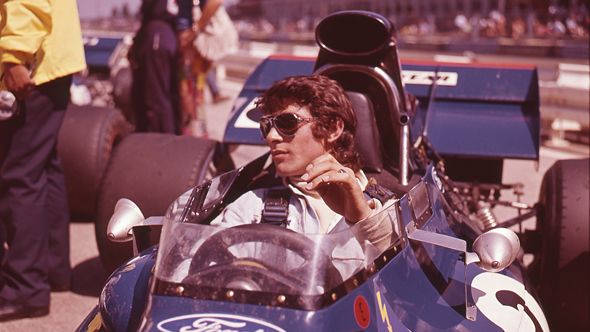Eye For Film >> Movies >> 1 - Life On The Limit (2013) Film Review
1 - Life On The Limit
Reviewed by: Jeff Robson

Typical – you wait years for a film focusing on that most cinematic of sports, F1 racing, then three come along at once.
Hot on the exhaust pipe of Ron Howard’s turbo-charged but ultimately unsatisfying Hunt-Lauda biopic Rush and not that far behind Asif Kapadia’s acclaimed documentary Senna comes what I’ve often thought had the potential to be the most fascinating approach of all – an overview of the sport itself from its 1930s gentleman-amateur origins to today’s multibillion corporate and media behemoth.

Crowder’s film is clearly a labour of love and offers a more multi-angled approach than anything I can recall that’s gone before. And if in the end it has a little too much of an “official version” feel to it, there’s still enough high-adrenaline racing footage and candid conversation with the greats to interest even non-petrolheads.
It takes as its starting point the 1996 Melbourne Grand Prix, where an atmospheric pre-credits sequence climaxes with an audience-jolting crash involving the British driver Martin Brundle. The fact that he’s unscathed and, like all the other drivers involved, fit enough to take part in the restarted race is used to illustrate the sea change in the approach to safety taken by a sport that used to accept driver fatalities as an inevitable part of the Grand Prix season.
After a brief but visually stunning sequence encapsulating the sport’s pre- and post-war origins – all vintage posters and grainy monochrome footage of Fangio et al - the film places its focus squarely on the 60s and 70s. It was certainly a time when the sport loomed large in the public eye, perhaps because so many of its stars were British – not only drivers like Jackie Stewart and Graham Hill but also designers such as Colin Chapman, whose Lotus models challenged the dominance of established European marques such as Ferrari.
Anyone who, like me, remembers Murray Walker’s INCREASINGLY excited commentary as the soundtrack to Sunday afternoon homework will feel a glow of nostalgia at seeing their boyhood heroes – equal parts fighter pilot, astronaut, rock star and medieval jouster – up there on screen in all their Brylcreemed and wing-collared glory.
But the film’s very clear-eyed in its depiction of the chaotic organisation and lack of regard for basic safety that saw such a heavy toll exacted – for every household name there’s a Jochen Rindt or Francois Cevert, potential all-time greats cut short in their prime as the cars got bigger and faster but the tracks and safety barriers stayed the same.
The efforts of Stewart, Fitipaldi and others to form a drivers’ union explaining to the suits exactly what it was like at the sharp end, and the work of team managers and engineers like Ecclestone and Mosley to make the entire operation more professional and commercially driven form the spine of the narrative. But the film isn’t just a statfest for the Top Gear audience, focusing also on the wives and girlfriends waiting anxiously in the paddock, forming a bond that mirrors the guys’ “dawn patrol” camaraderie.
The race footage is as stunning as you’d expect; Fassbender’s narration has just the right blend of fanboy enthusiasm and authoritative summation; and the soundtrack, set firmly in the key of rock, may not be to everyone’s taste but for me captures the full-throttle atmosphere of the circuit.
The interviewees give good value for money too – Stewart is the epitome of avuncular, common-sense Scottishness but the flashback footage (and his still luxuriant mane) are a reminder of his peerless talent and pin-up cool; while the spellcheck-confounding Ickx, (interviewed in a marina-side Riviera cafe rather than the back-offices or cosy living rooms of the other talking heads) still radiates the maverick charisma that saw him eschew the drivers’ union and acquire one of the sport’s first ‘bad boy’ images.
But the focus on the giants of this era gives the film a somewhat unbalanced feel – the last 20 years of the sport are covered very sketchily, with the likes of Michael Schumacher (statistically at least, the greatest driver F1’s ever known) relegated to supporting player status. And I’d have liked to see more focus on the sport’s recent upheavals (such as the 2009 standoff between the governing body and the teams) and its political dimensions, with emerging economies spending big to acquire a grand prix as a mark of status and the Brazilian government using Ayrton Senna’s popularity as a “good news” story to divert attention from the country’s wider problems.
That’s a lot to cram into two hours, though, and as an evocation of the compelling nature of a sport which, like virtually no other, still requires its competitors to lay their lives on the line every time and brings out the most visceral if not always the most edifying emotions in its spectators (as Brundle himself candidly puts it: “we all like to see a shunt”) 1 definitely stands comparison with the likes of When We Were Kings and Fire In Babylon.
It also whets the appetite for the upcoming Weekend Of A Champion, focusing on the friendship between Jackie Stewart and Roman Polanski. And I’m convinced that a Scorsese or David Fincher could take one of F1’s backstories (or fuse its key elements) to create not just Grand Prix II but the motor racing equivalent of Raging Bull or The Social Network. Gentlemen, start your engines...
Reviewed on: 23 Oct 2013

















